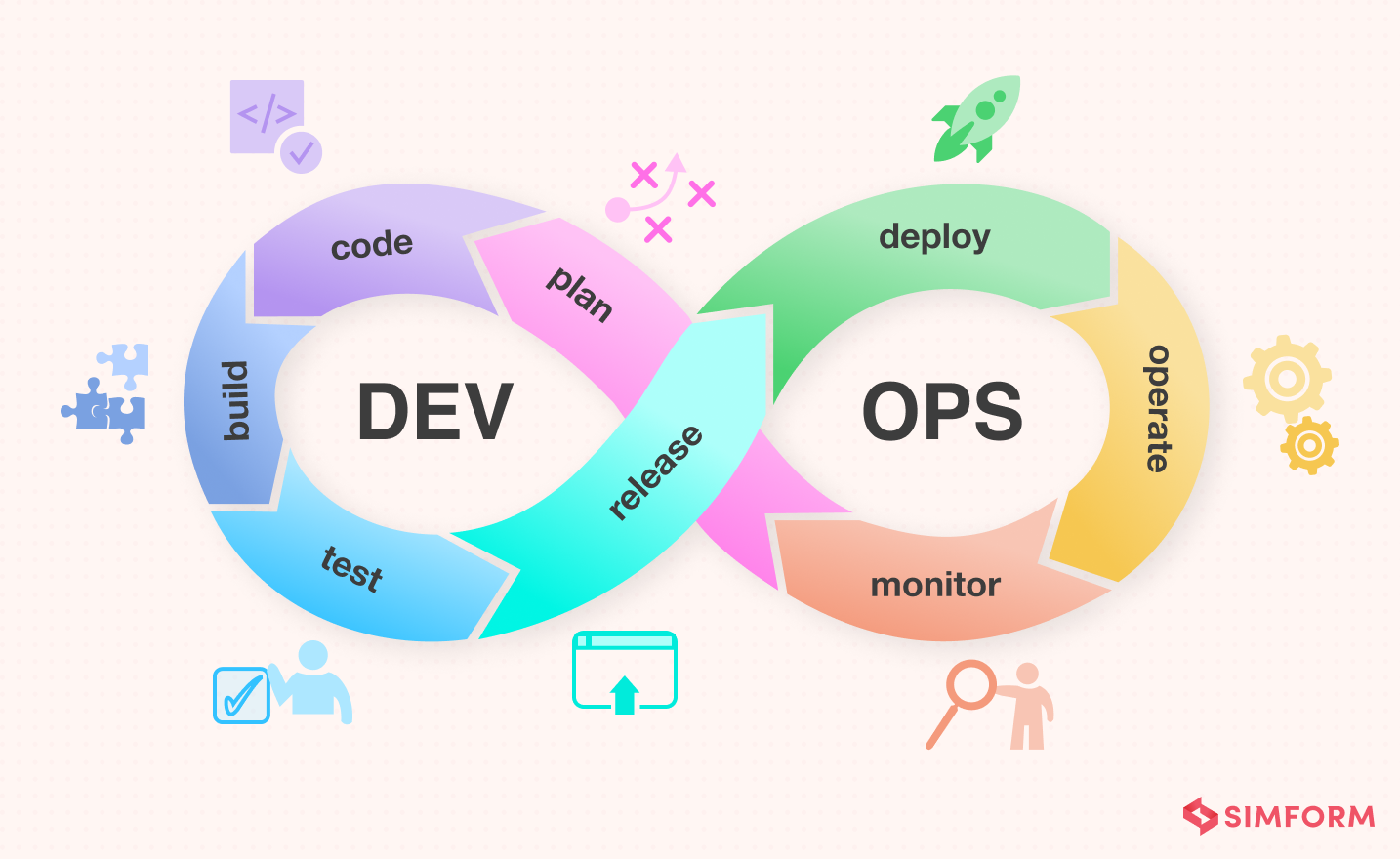🚀DevOps Demystified: Bridging the gap between Development and Operations # Day1
 Vaishnavi Modakwar
Vaishnavi Modakwar
What is DevOps?
In today's rapidly evolving tech landscape, the term DevOps is frequently mentioned. But what does it truly mean? At its core, DevOps is a blend of Development (Dev) and Operations (Ops) practices designed to enhance the software development lifecycle. It encourages collaboration, automates workflows, and scales infrastructure to ensure the efficient delivery of high-quality software. Let's explore the fundamentals of DevOps! 🌟
Key Concepts of DevOps
The DevOps Lifecycle: An Overview
Imagine a loop that never ends. That’s the DevOps lifecycle! It's a continuous process consisting of several stages:
Plan 📋: Teams brainstorm and outline what needs to be built.
Code 💻: Developers write the software code.
Build 🛠️: The code is compiled and built into a product.
Test 🧪: The product is tested for bugs and issues.
Release 🚀: The product is released to the users.
Deploy 📦: The product is deployed to production environment.
Operate ⚙️: The product is operated in the live environment.
Monitor 📈: The product’s performance is monitored, and feedback is gathered for improvements.
This cycle repeats continuously, ensuring rapid and reliable delivery of software.
Collaboration: Bridging the Gap
DevOps promotes strong collaboration between development and operations teams. By working together, they can solve problems faster and innovate more effectively. This teamwork is the foundation of successful DevOps practices.
Automation Streamline Processes
Automation is a key aspect of DevOps. By automating repetitive tasks like testing, integration, and deployment, teams can save time and reduce errors. Automation tools ensure that processes are consistent and reliable.
Continuous Integration and Continuous Deployment (CI/CD)
CI/CD pipelines are core to DevOps. Continuous Integration (CI) ensures that code changes are automatically tested and merged, while Continuous Deployment (CD) automates the release process. This results in faster and more reliable software delivery. Advanced CI/CD practices include automated rollback mechanisms, blue-green deployments, and canary releases to ensure minimal downtime and risk."
Scaling Infrastructure (Adapt and Grow)
DevOps practices include scaling infrastructure efficiently. Using tools like containerization and orchestration, teams can easily scale applications to meet demand. This flexibility ensures that infrastructure can grow with the needs of the business.
Monitoring and Feedback: Continuous Improvement
DevOps emphasizes continuous monitoring and feedback. By tracking performance and gathering user feedback, teams can make informed decisions to improve software and fix issues promptly. This leads to a cycle of constant enhancement.
Why DevOps?
Faster Delivery: Quick Updates
DevOps accelerates the process of delivering software updates and new features. This means users get improvements and fixes faster, keeping software fresh and up-to-date.
Better Quality: Fewer Bugs
With continuous testing and integration, DevOps helps catch and fix bugs early. This leads to higher quality software with fewer issues for users.
Greater Efficiency: Save Time
Automation in DevOps streamlines repetitive tasks, making the development process more efficient. This saves time and reduces the chance of human error.
Better Collaboration: Teamwork
DevOps promotes strong collaboration between development and operations teams. This teamwork leads to faster problem-solving and more innovative solutions.
Happy Users: Customer Satisfaction
By delivering reliable and timely updates, DevOps ensures users have a seamless experience, resulting in greater satisfaction and trust.
DevOps Tools
DevOps relies on a variety of tools to automate and streamline processes, making development and operations more efficient. Here are some essential categories and tools:
Version Control: Git, GitHub, GitLab.
CI/CD: Jenkins, Travis CI, CircleCI.
Configuration Management: Ansible, Puppet, Chef.
Containerization: Docker, Kubernetes.
Monitoring and Logging: Prometheus, Grafana, ELK Stack (Elasticsearch Logstash Kibana)
Collaboration: Slack, Microsoft Teams, JIRA.
These tools help teams collaborate effectively, automate repetitive tasks, and maintain high-quality software delivery.
DevOps Culture
DevOps culture is all about teams working together better. It helps developers and operations communicate, automate tasks, and always improve. This means faster updates, better quality software, and more new ideas. Embrace DevOps to boost your team's success! 🚀
Real - Life Example
DevOps in Real Life: Pizza Delivery
In a pizza restaurant, chefs (developers) and delivery drivers (operations) work closely together. They use automated ovens (automation) to cook pizzas perfectly and quickly. By constantly communicating and improving based on customer feedback, they deliver hot, delicious pizzas fast. This teamwork and efficiency is what DevOps brings to software development!
Conclusion
DevOps is all about improving the way teams work together to deliver software quickly, efficiently, and reliably. By fostering collaboration, automating processes, and focusing on continuous improvement, DevOps helps companies stay competitive and keep their users happy.
So, whether you're in IT or not, understanding the benefits of DevOps can give you a glimpse into how modern software is built and maintained. Are you ready to embrace the DevOps journey? Let’s innovate and succeed together! 🚀
Call to Action:
If you found this post helpful, don’t forget to like, share, and follow my blog for more tech insights! Feel free to drop any questions or thoughts in the comments below💬👇.
Subscribe to my newsletter
Read articles from Vaishnavi Modakwar directly inside your inbox. Subscribe to the newsletter, and don't miss out.
Written by

Vaishnavi Modakwar
Vaishnavi Modakwar
👋 Hi there! I'm Vaishnavi Modakwar, a dedicated DevOps and Cloud Engineer with 2 years of hands-on experience in the tech industry. My journey in DevOps has been fueled by a passion for optimizing and automating processes to deliver high-quality software efficiently. Skills: Cloud Technologies: AWS, Azure. Languages: Python, YAML, Bash Scripting. Containerization: Docker, ECS, Kubernetes. IAC: Terraform, Cloud Formation. Operating System: Linux and MS Windows. Tools: Jenkins, Selenium, Git, GitHub, Maven, Ansible. Monitoring: Prometheus, Grafana. I am passionate about demystifying complex DevOps concepts and providing practical tips on automation and infrastructure management. I believe in continuous learning and enjoy keeping up with the latest trends and technologies in the DevOps space. 📝 On my blog, you'll find tutorials, insights, and stories from my tech adventures. Whether you're looking to learn about CI/CD pipelines, cloud infrastructure, or containerization, my goal is to share knowledge and inspire others in the DevOps community. Let's Connect: I'm always eager to connect with like-minded professionals and enthusiasts. Feel free to reach out for discussions, collaborations, or feedback. Wave me at vaishnavimodakwar@gmail.com